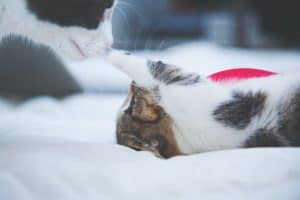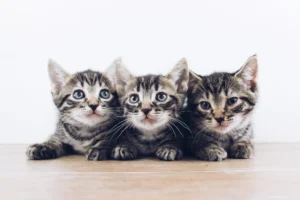Cats have a reputation for being playful and sometimes unpredictable creatures, and one common behavior that owners often encounter is their cat attacking fingers. But why do cats do this? Let’s explore the reasons behind this feline behavior.
Cats attack fingers as part of their natural instinct to play and hunt. They may see fingers moving and wiggling as prey to chase and capture. This behavior is often more common in kittens, who are learning to use their hunting skills, but adult cats may also engage in this behavior for various reasons. Understanding why cats attack fingers can help owners better interact with their pets and prevent accidental scratches or bites.
Playful Nature: Exploring the instinctual playfulness of cats
Cats are known for their playful nature, often engaging in behaviors that mimic their hunting instincts. When cats attack fingers, it’s typically a form of play rooted in their natural instincts. Playful antics such as pouncing, chasing, and swatting are all behaviors that come from a cat’s innate drive to hunt and play.
One reason why cats may target fingers as part of their play is because fingers resemble the quick, unpredictable movements of prey. In the wild, cats are skilled hunters that rely on their sharp senses and agility to catch their prey. When they see fingers moving rapidly, it triggers their hunting instincts, causing them to playfully attack in an attempt to “catch” their moving target.
To redirect this playful behavior, provide your cat with plenty of interactive toys that mimic the movements of prey. Toys that allow your cat to chase, pounce, and bat at objects can help satisfy their innate need to hunt and play without resorting to attacking fingers. Additionally, ensure your cat gets regular play and exercise to channel their energy in a positive way.
Hunting Behavior: Discussing the connection between finger attacks and hunting behavior
Cats have a strong instinct for hunting, which is why they may see fingers as moving prey and instinctually respond by attacking. This behavior is deeply ingrained in their DNA, as cats are natural-born predators with a keen sense of sight, sound, and movement.
When a cat attacks fingers, they are simply following their natural hunting instincts. To a cat, fingers moving erratically can resemble prey trying to escape, triggering their predatory drive. In the feline world, play often mimics hunting behaviors, which is why your cat may engage in playful attacks on your fingers.
To discourage this behavior, avoid using your hands as toys during playtime. Opt for interactive toys that keep your cat engaged and provide an outlet for their hunting instincts. By redirecting their attention to appropriate toys, you can help your cat fulfill their hunting urges in a safe and constructive manner.
Remember, understanding your cat’s natural instincts and providing appropriate outlets for their behavior is key to fostering a happy and healthy relationship with your feline friend.
Lack of Stimulation:
Have you ever found your feline friend pouncing on your fingers out of the blue? Well, boredom might be the culprit here. Cats are curious creatures that need mental and physical stimulation to keep them entertained and prevent them from resorting to finger attacks. Make sure to provide interactive toys, scratching posts, and playtime to keep your cat engaged and satisfied. A bored cat is more likely to see your fingers as a plaything, so keeping them entertained can help reduce these unexpected attacks.
Socialization:
Did you know that a cat’s early experiences and socialization play a significant role in their behavior, including finger attacks? Cats that were not properly socialized during their formative stages may be more prone to displaying aggressive behaviors like attacking fingers. It’s crucial to expose kittens to various people, animals, and environments early on to help them develop positive behavior patterns. Additionally, providing positive reinforcement and rewards for good behavior can help shape your cat’s interactions in a positive way.
- Set boundaries: While playing with your cat, avoid using your hands as toys to prevent them from associating fingers with playtime. Instead, opt for interactive toys that keep a safe distance between your fingers and your cat’s sharp claws.
- Provide scratching alternatives: Cats often attack fingers as a way to satisfy their natural urge to scratch and play. Offering appropriate scratching posts and toys can redirect this behavior and save your fingers from becoming a target.
- Consult a professional: If your cat’s finger attacks are persistent and aggressive, seeking guidance from a veterinarian or animal behaviorist can help address any underlying issues causing this behavior. Remember, understanding your cat’s needs and behavior is key to fostering a healthy and harmonious relationship.
Redirecting Behavior: Offering tips on how to redirect a cat’s focus away from attacking fingers
If your feline friend tends to pounce on your fingers during playtime, there are effective ways to redirect this behavior. One key tip is to provide plenty of engaging toys for your cat to play with, such as interactive toys or puzzle feeders. By offering alternative outlets for their energy and hunting instincts, you can help steer their focus away from your fingers. Additionally, try using a wand toy or a laser pointer to keep your cat entertained and engaged in a safer way. Remember, consistency is key when training your cat, so be patient and reinforce positive behaviors.
Veterinarian Consultation: Discussing when to seek professional help for persistent finger attacking behavior
If your cat’s finger attacking behavior persists despite your best efforts to redirect it, it may be time to consult a veterinarian or animal behaviorist for further assistance. Persistent finger attacks could be a sign of underlying issues such as anxiety, fear, or aggression that require professional intervention. A professional can help assess your cat’s behavior, identify potential triggers, and recommend appropriate measures to address the problem. Don’t hesitate to seek expert guidance if you’re struggling to manage your cat’s behavior effectively.
Additional Insight: One useful strategy to address persistent finger attacking behavior is to ensure your cat has a designated space, such as a cat tree or scratching post, where they can engage in natural behaviors like scratching and climbing. Providing an enriched environment can help reduce stress and redirect your cat’s energy away from attacking fingers.
Interactive Toys:
When it comes to understanding why cats attack fingers, it’s essential to provide them with appropriate outlets for their natural hunting instincts. Interactive toys play a crucial role in engaging cats and redirecting their playful energy away from human hands. Toys like feather wands, laser pointers, and puzzle feeders can stimulate their minds and bodies, keeping them entertained and satisfied.
Engaging in playtime activities with your cat not only strengthens your bond but also helps prevent finger attacks. Spend at least 10-15 minutes daily engaging your cat in interactive play. By mimicking the movements of prey, you can satisfy their hunting instincts in a safe and enjoyable way.
Investing in a variety of toys and rotating them regularly can keep your cat mentally stimulated and reduce the likelihood of them resorting to finger attacks. Additionally, consider incorporating scratching posts and climbing structures to provide physical outlets for their energy and help maintain their claws.
Remember, a well-entertained cat is a happy cat, less likely to resort to biting or scratching. By enriching their environment with engaging toys and playtime activities, you can create a harmonious and fulfilling relationship with your feline companion.
Recommended interactive toys: 1. Feather wand 2. Laser pointer 3. Puzzle feeders 4. Catnip toys 5. Ball track toys
By providing a stimulating environment and engaging play experiences, you can effectively address the root causes of finger attacks in cats and promote a healthy and happy relationship with your furry friend.
Alex, a passionate animal lover, has experience in training and understanding animal behavior. As a proud pet parent to two dogs and three cats, he founded AnimalReport.net to share insights from animal experts and expand his knowledge of the animal kingdom.




